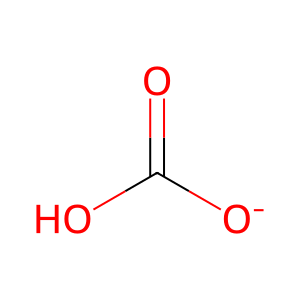Reaction: Defective SLC4A1 does not exchange Cl- for HCO3- (in erythrocytes)
The proteins responsible for the exchange of Cl- with HCO3- are members of the SLC4 (1-3) and SLC26 (3, 4, 6, 7 and 9) transporter families. SLC4A1 (Band 3, AE1, anion exchanger 1) was the first bicarbonate transporter gene to be cloned and sequenced. It is ubiquitous throughout vertebrates and in humans, is the major glycoprotein present on erythrocytes and the basolateral surfaces of kidney cells. Variations in erythroid SLC4A1 determine the Diego blood group system. Mutations in the erythrocyte form of SLC4A1 can cause hereditary spherocytosis type 4 (SPH4; MIM:612653), a disorder leading to haemolytic anaemia (HA). Mutations include V488M and E90K (Ribiero et al. 2000, Bracher et al. 2001).
Some mutations in SLC4A1 can cause distal (type1) renal tubular acidosis (dRTA; MIM:179800) (an inability to acidify urine) and include R589H, R589C and S613F (Bruce et al. 1997). Mutations causing dRTA-HA (MIM:611590) include G701D and V850del (Bruce et al. 2000).
Some mutations in SLC4A1 can cause distal (type1) renal tubular acidosis (dRTA; MIM:179800) (an inability to acidify urine) and include R589H, R589C and S613F (Bruce et al. 1997). Mutations causing dRTA-HA (MIM:611590) include G701D and V850del (Bruce et al. 2000).
Reaction - small molecule participants:
Cl- [extracellular region]
HCO3- [cytosol]
Reactome.org reaction link: R-HSA-5656248
======
Reaction input - small molecules:
chloride
hydrogencarbonate
Reaction output - small molecules:
Reactome.org link: R-HSA-5656248


